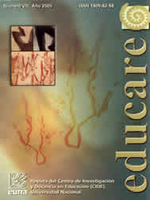Crisis en la educación secundaria: ¿reproducir o transformar?
DOI:
https://doi.org/10.15359/ree.2005-8.4Abstract
Abstract. The authors depart from the query that Costa Rican High School Education is in the middle of a crisis. In this article they affirm the need to relate this situation with the social context surrounding it. The conclusion is that there is indeed a crisis in high school education and it is expressed by means of rejection, social violence and its imitation inside the classroom, teachers’ indisposition, and the curriculum’s technocratic and fragmentary nature; all of which brings about a lack of sense in education for both students and teachers.
There is also reference to several articles that address this crisis, such as those published by the media, the Ministry of Public Education and other educational institutions. We propose the development of a theoretical framework that will allow for the establishment of a political and pedagogical understanding of the situation now experienced in high school education. Such framework will also prompt all of us who daily work for the education of the youth to give serious thought to the issue and develop an active awareness.
References
Apple, M. ( 1997). Teoría crítica y educación. Buenos Aires, Argentina: Miño y Dávila Editores.
Bemstein, B. (1996). Pedagogía, control simbólico e identidad. Madrid,
España: Morata.
Freire, P. (1997). "Educación y participación comunitaria". En: Nuevas perspectivas críticas en Educación. Buenos Aires, Argentina: Piados Educador. Pp. 83-96.
Giroux, H. (2001). Cultura, Política y Práctica Educativa. Barcelona, España: GRAO.
McLaren, P. (1995). La escuela como un performance ritual. Hacia una economía política de los símbolos y gestos educativos. Madrid, España: Siglo XXI editores.
Merani, A. (1980). Educación y relaciones de poder. México, D.F.: Ediciones Sol.
Pacheco, X. ( 1997). "El trabajo organizado para desarticular esperanzas". En: Revista Casa de la Mujer. Año 6, Nº 9, octubre de 1997. 42-47.
Pérez, A. (2000). La cultura escolar en la sociedad neoliberal. Madrid, España: Morata.
Pérez, R. (1996). "Subjetividad y estructura social: un acercamiento a la actual situación sociopolítica costarricense". En: Dominación social y subjetividad. Contribuciones de la Psicología Social. San José, Costa Rica: Editorial de la Universidad de Costa Rica. 23-29.
Proyecto Estado de la Nación en Desarrollo Humano Sostenible. Estado de la Nación en Desarrollo Humano Sostenible. Informes: Séptimo (2000), Octavo (2001) y Noveno (2002). San José, Costa Rica. Proyecto Estado de la Nación. San José, Costa Rica: Editorama.
Published
How to Cite
Issue
Section
License
1. In case the submitted paper is accepted for publication, the author(s) FREELY, COSTLESS, EXCLUSIVELY AND FOR AN INDEFINITE TERM transfer copyrights and patrimonial rights to Universidad Nacional (UNA, Costa Rica). For more details check the Originality Statement and Copyright Transfer Agreement
2. REUTILIZATION RIGHTS: UNA authorizes authors to use, for any purpose (among them selfarchiving or autoarchiving) and to publish in the Internet in any electronic site, the paper´'s final version, both approved and published (post print), as long as it is done with a non commercial purpose, does not generate derivates without previous consentment and recognizes both publisher's name and authorship.
3. The submission and possible publication of the paper in the Educare Electronic Journal is ruled by the Journal’s editorial policies, the institutional rules of Universidad Nacional and the laws of the Republic of Costa Rica. Additionally, any possible difference of opinion or future dispute shall be settled in accordance with the mechanisms of Alternative Dispute Resolution and the Costa Rican Jurisdiction.
4. In all cases, it is understood that the opinions issued are those of the authors and do not necessarily reflect the position and opinion of Educare, CIDE or Universidad Nacional, Costa Rica. It is also understood that, in the exercise of academic freedom, the authors have carried out a rogorous scientific-academic process of research, reflection and argumentation thar lays within the thematic scope of interest of the Journal.
5. The papers published by Educare Electronic Journal use a Creative Commons License:















 The articles published by Educare Electronic Journal can be shared with a Creative Commons License:
The articles published by Educare Electronic Journal can be shared with a Creative Commons License: 



